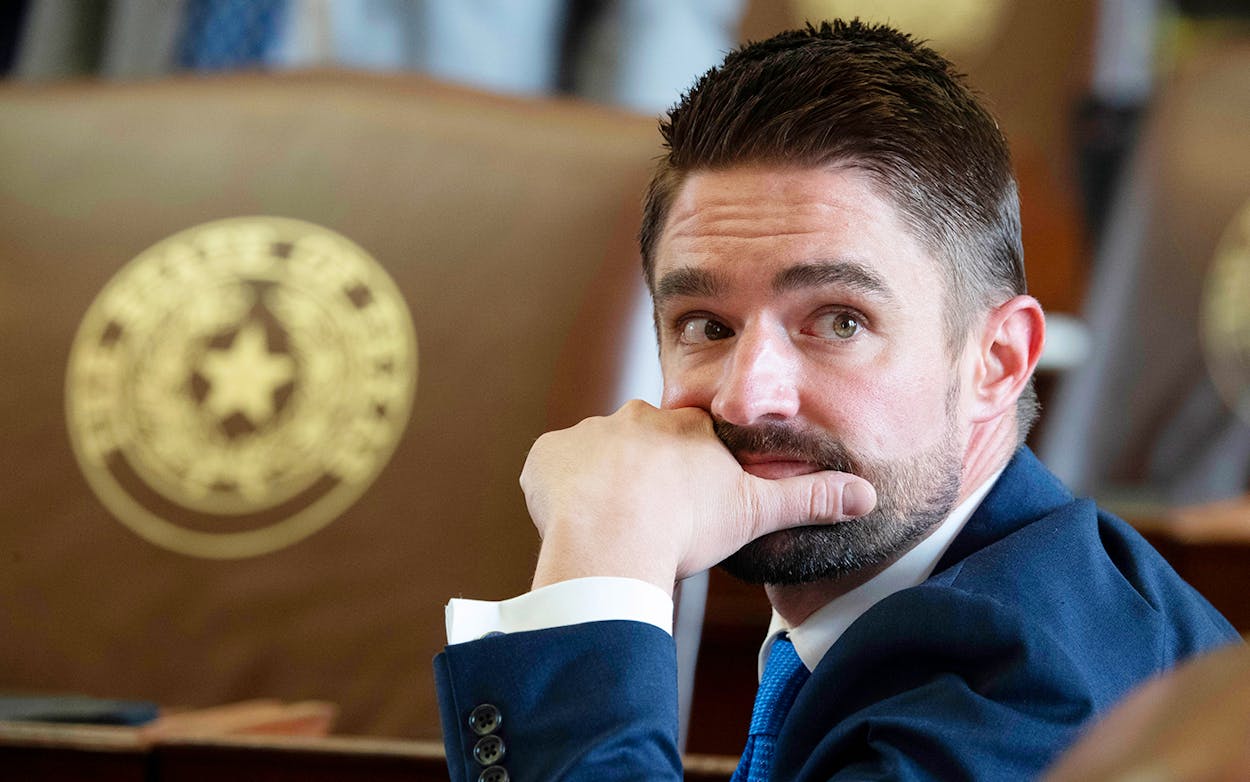The proposed ban on a personal income tax that’s flying through the Legislature may also blow a hole in the state’s business franchise tax—a tax that Governor Greg Abbott has said he wants to put in “a coffin.” On Friday, Senator Kirk Watson, D-Austin, questioned whether the real purpose of the income-tax ban was to undermine the state’s business tax, calling the proposal a “stalking horse.” If Watson’s right, the state could lose billions of dollars in revenue and decrease the chances of property tax relief in the future.
In the previous two legislative session, Abbott called for seriously reducing or eliminating the franchise tax, but the effort failed because the tax just produces too much money—a little more than $7.4 billion for every two-year state budget. This year, Abbott tried a new tack. Instead of eliminating the business tax, he proposed cutting school property taxes by increasing the state sales tax by 1 percent, which give Texas the highest sales tax rate in the country, along with California. That turned into one of the biggest legislative belly flops in recent memory.
But if you are a legislator who wants to tell voters next year that you did something about taxes, what’s better than a vote against an income tax? Hence House Joint Resolution 38, which asks voters to amend the Texas Constitution to prohibit an income tax on “individuals.” It’s that word—“individuals”—that may have far more sweeping consequences than it would seem. The Legislative Budget Board has warned lawmakers that that single word could invite new challenges to the franchise tax.
By way of background: Texas already has a prohibition on a state personal income tax in the form of a constitutional amendment—the so-called Bullock Amendment—passed in 1993. The lieutenant governor at the time—Bob Bullock—had proposed an income tax in 1991 on both business and individuals to pay for public school operations. Bullock said without an income tax, Texas would eventually have to greatly increase the sales tax to pay for schools. Bullock was prescient. That’s exactly what the legislative leadership faced this year in its effort to cut property taxes. But being right is not rewarded in a state where the idea of an income tax is pure political poison. Bullock saved his hide before the 1994 election by getting the Legislature to send voters an amendment barring a personal income tax, an amendment that easily passed.
The Bullock Amendment specifically prohibited an income tax on “natural persons,” including a person’s share of income from a business partnership. After the state’s business tax was expanded in 2006 to include partnerships, a lawsuit ensued challenging the new law as an income tax. The Texas Supreme Court ruled in 2011 that the new franchise tax was not an income tax because the tax was levied against the partnership, not the partners.
On the surface, this year’s HJR 38 by Representative Jeff Leach in the House and Pat Fallon in the Senate is nothing more than an effort to make it even more difficult to adopt a personal income tax. The Bullock Amendment allows the Legislature to pass an income tax to take effect only if approved by a majority vote of Texans. But the Leach/Fallon amendment would require the Constitution to be amended yet again to adopt an income tax—meaning a two-thirds vote of both chambers would be required rather than a simple majority.
But here’s the rub: The Leach/Fallon proposal replaces the words “natural persons” with “individuals.” A “natural person” is a living, breathing human, but business entities can have personhood under the law. They are “individuals.” This is precisely what the Legislative Budget Board is warning about.
“The term ‘individuals’ is not defined and could be interpreted to include entities that are currently subject to the state’s franchise tax,” the LBB report said. “To the extent the joint resolution might exempt some entities from the franchise tax, there could be a loss to state revenue. Because such a determination would depend on potential future legal decisions, the effect of the joint resolution on state revenue cannot be estimated.”
I asked the Texas Comptroller’s Office if officials there could give me a breakdown on how much money comes in from corporations and how much from partnerships. But that was not available.
The amendment barely passed the House on May 9 by a vote of 100-42. Because a two-thirds vote—one hundred lawmakers—is required to pass proposed constitutional amendments, the Republicans had to recruit quite a few Democrats to join their cause. But some lawmakers have sniffed out the stealth attack on the franchise tax. When it came before the Senate Finance Committee Friday, Watson questioned Fallon about the LBB fiscal note and asked whether the amendment is a “stalking horse” to get rid of the franchise tax. Fallon insisted that it was not. He said it is merely an effort to make passing a state income tax more difficult. Watson questioned whether there should be an amendment to define an “individual” as a living person. Fallon replied that it was unnecessary because it’s clear that an individual is an individual person. The committee sent the proposed amendment to the full Senate on a 9-2 vote, with only Democrats Watson of Austin and Royce West of Dallas opposing it.
But during public testimony, Dick Lavine of the Center for Public Policy Priorities offered a simple solution: Change the wording back to “natural persons” as in current law. “Don’t fight about it,” he said.
- More About:
- Politics & Policy
- Business
- Kirk Watson






